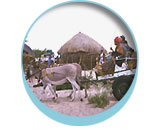 |
Satellite Workshop 6 Migrants and Homelands: Dynamics of Networks and Communication |
|
| Program and Abstracts >> |
Poster >> |
|
Increasing attention has focused on migrant mobility. In this Satellite Workshop, in combination with one of the Main Symposium Panels entitled “The Construction of Migrants’ Social Spaces: Issues of Mobility, Locality, and Trans-Border Networks,” we will focus on the bilateral relations between migrants and their homelands and discuss the associated dynamic changes of societies and regions.
Social science researchers have approached population mobility research from political, economic, and cultural methodologies. However, most previous studies have perceived migration as a linear, one-way movement, assuming that migrants change their status simply from emigrants to settlers, and have discussed socio-cultural changes in this regard in host communities or in homelands. For example, migration issues have been examined through themes such as assimilation, adaptation, accommodation, confrontation with local societies, and transformation of migrants’ culture and identity. Migration has also been analyzed from an outsiders’ perspective, based on push/pull theory and macro-level political and economic factors, without referring to the socio-cultural factors and the experiences of the migrants themselves.
Migration is created and negotiated through communication between migrants and their homelands. In other words, the homeland is not only the place of origin but is also articulated and imagined symbolically by the migrants, according to the changing socio-cultural environments in which they live. Therefore, we must explore how the social space of migrants is shaped and created dynamically, not from outsiders’ perspectives, but from the migrants’ own experiences, ideas, and perceptions. Furthermore, the study of mobility also relates to inter-regional networks that reach beyond bounded territories.
| >>Satellite Workshop 6: Program and Abstracts | ||
| 9:30-10:10 | The Construction of an Imagined “Village” in an African City: The Case of the Bamiléké of Cameroon NOMOTO Misa (The International University of Kagoshima) |
|
| 10:10-10:50 | Marrying in a Foreign Land? A Case Study of a Muslim Community in Manila,
Philippines WATANABE Akiko (ASAFAS, Kyoto University) |
|
| 10:50-11:30 | Creating New ‘Homes’ on the Outskirts of the Resettlement Site: Alternative Settlement Behavior among the Resettled San Hunter-Gathers MARUYAMA Junko (ASAFAS, Kyoto University) |
|
| 11:30-13:00 | Lunch | |
| 13:00-13:40 | The Construction of Haw Muslim Identities in Northern Thailand Suchart Setthamalinee (Payap University / University of Hawai'i at Manoa) |
|
| 13:40-14:20 | Going to the Metropolis and Building Leadership in the Homeland: A Case Study of Palau, Micronesia IITAKA Shingo (Tokyo Metropolitan University) |
|
| 14:20-15:00 | Remittances and Transnational Social Space SHIBUYA Tsutomu (Tohoku University) |
|
| 15:00-15:20 | Coffee Break | |
| 15:20-16:00 | Hawaii’s Okinawan Migritude and Museums SHIROTA Chika (Oita Prefectural College of Arts and Culture) |
|
| 16:00-16:40 | Constructing the Emigrant’s Village in Transnational Social Space: The Experience of Papua New Guinean Chinese ICHIKAWA Tetsu (National Museum of Ethnology) |
|
| 16:40-17:30 | Discussion | |